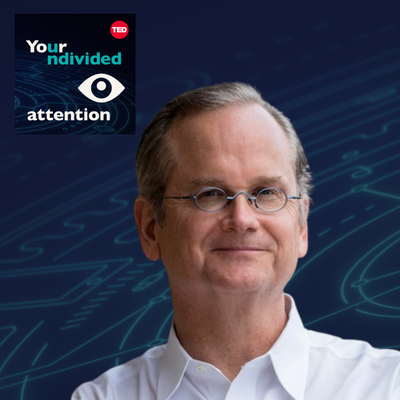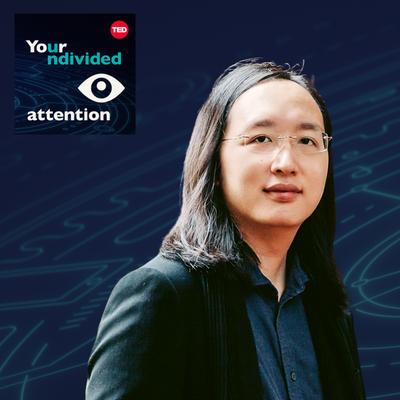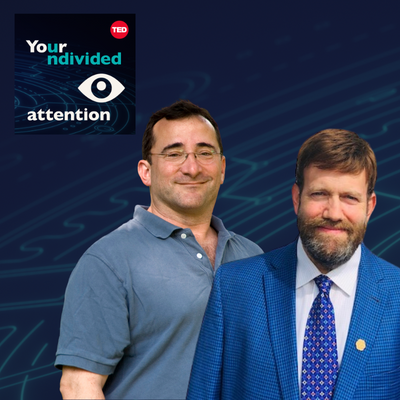Episode 58 | Oct 20, 2022
They Don't Represent Us with Larry Lessig
We often talk about the need to protect American democracy. But perhaps those of us in the United States don't currently live in a democracy.
As research shows, there's pretty much no correlation between the percentage of the population that supports a policy and its likelihood of being enacted. The strongest determinant of whether a policy gets enacted is how much money is behind it.
So, how might we not just protect, but better yet revive our democracy? How might we revive the relationship between the will of the people and the actions of our government?
This week on Your Undivided Attention, we're doing something special. As we near the election, and representation is on our minds, we're airing a talk by Harvard Law professor and Creative Commons co-founder Larry Lessig. It's a 2019 talk he gave at the Politics and Prose bookstore in Washington, DC about his book, They Don't Represent Us.
The book title has two meanings: first, they — as in our elected representatives — don't represent us. And second, we — as in the people — don't represent ourselves. And this is where social media comes in: we don't represent ourselves because the more we use social media, the more we see extreme versions of the other side, and the more extreme, outraged, and polarized we ourselves become.
Last note: Lessig's talk is highly visual. We edited it lightly for clarity, and jump in periodically to narrate things you can’t see. But if you prefer to watch his talk, you can find the link by scrolling down to Recommended Media.
Major Takeaways
Lessig addresses several dimensions of inequality:
~Unequal vote - we allow states to set their rules in ways that suppress the opportunity of the party that happens to not be in power
~Gerrymandering - politicians pick the voters as opposed to the voters picking the politicians, pushing parties to extremes
~Campaign finance - candidates “dial for dollars” and call on the wealthy to fund their campaigns, effectively giving the elite more of a voice
The introduction of new and significant technologies like broadcasting and polling changed everything. More citizens became engaged in politics in the twentieth century because they engaged with mainstream, trusted media sources via television and radio. George Gallup pioneered the science of polling so we can more accurately gauge what people think. These technologies progressed a “common set of facts” that promoted mutual understanding.
The 21st century brought more technology changes like cable television and the internet. As sources exploded, society fragmented. Given all the available options, a lot of people moved away from the news. Those who continued to watch were “partisan junkies,” changing the business model of broadcasters from Cronkite to Hannity. Digital platforms started exploiting our attention to overcome our natural resistance to what they were giving us: advertisements.
Can democracy work with fragmented media and a legible public? How do we do democracy if we can’t count on everyone having shared understanding? Lessig isn’t sure if we can fix “us”, but we must try to fix “them” - the candidates.
Lessig’s POTUS 1 proposal is a solid start to addressing these issues. POTUS 1 is the Presidential version of HR-1, a bill intended to expand voting rights, limit the influence of money in politics, ban partisan gerrymandering, and create new ethics rules for federal office holders. It passed the House in March of 2021, then stalled in the Senate. POTUS 1 asks Presidential candidates to commit to passing fundamental reforms first and foremost.
Other recommended reading
Video: They Don't Represent Us
The 2019 talk Larry Lessig gave at Politics and Prose in Washington, DC about his book of the same name
Book: They Don't Represent Us
Larry Lessig’s 2019 book that elaborates the ways in which democratic representation is in peril, and proposes a number of solutions to revive our democracy -- from ranked-choice voting to non-partisan open primaries
Testing Theories of American Politics: Elites, Interest Groups, and Average Citizens
Princeton's Martin Gilens and Benjamin I. Page study measuring the correlation between the preferences of different groups and the decisions of our government


